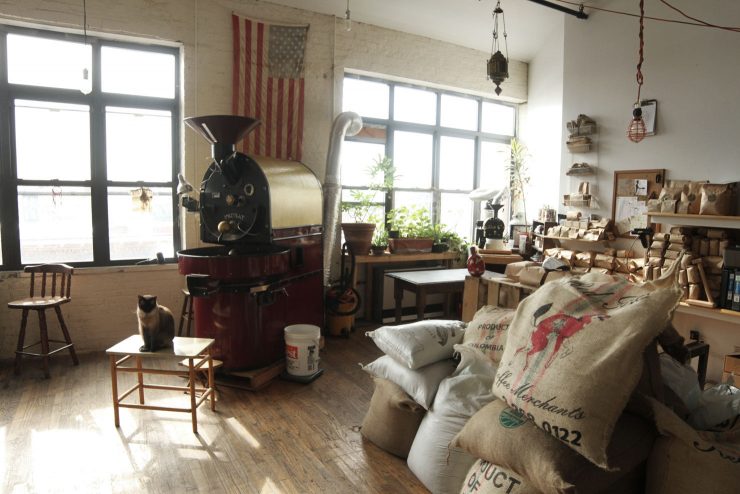
Brooklyn’s a great place to establish your boutique business or maker-enterprise, but if you’ve ever thought about roasting high-quality coffee to Scandinavian standards of delicacy in your loft apartment, Sprudge has bad news for you. Lofted Coffee has beat you to it.
Operating out of a just-shy-of-1000-square-foot loft in industrially zoned Bushwick, Lofted is either the most stylish coffee roaster in town, or the most potentially flammable lifestyle-magazine-ready-location in town—or both? It’s a sun-drenched, tall-windowed factory apartment: Wilco is streaming out of a turntable in a vintage suitcase when I arrive, succulents and cluster atop any table space not filled with coffee bags. My eyes scan the room for other highlights not always seen in a coffee roastery: vintage hats, a dream catcher, a toaster oven, some boat parts, a cat.
It’s the entrepreneurial dream of college friends Tobin Polk and Lance Schnorenberg—they met while having a crush on the same girl—who’ve lived and worked together on both coasts while developing their vision for what both coffee, and business, should taste like.
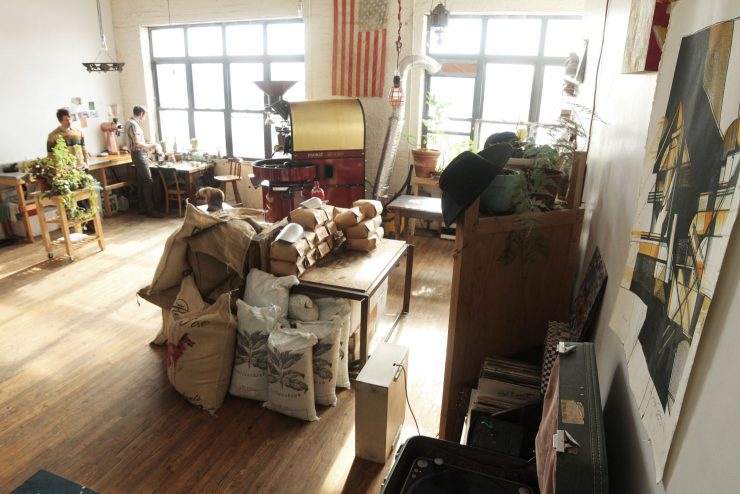
This unorthodox space is currently the site of Polk and Schnorenberg’s shared exploration of that vision. The pair moved to New York together four years ago, setting up shop—or rather, apartment—with a sample roaster and an eye towards developing a roasting style the pair would be proud to show the world.
Schnorenberg in particular brings a free-spirited approach to the roasting operation, as well as life. An alum of Espresso Vivace and Stumptown, he sees the Lofted space as a slow-growing evolution.
“The sample roaster [a 1 lb San Franciscan] has been in here the entire time and about two years ago we got the Probat. We got the space because we wanted to roast coffee, we knew that we wanted to do that, and then it kind of morphed into, well, we could actually probably do production roasting in this space,” says Schnorenberg. The loft currently has room to store approximately 2,000 lbs of green coffee—which must be carried up four stories when the freight elevator is unavailable. “We have been at times concerned about the floor falling through, but thus far it has not happened,” says Schnorenberg.
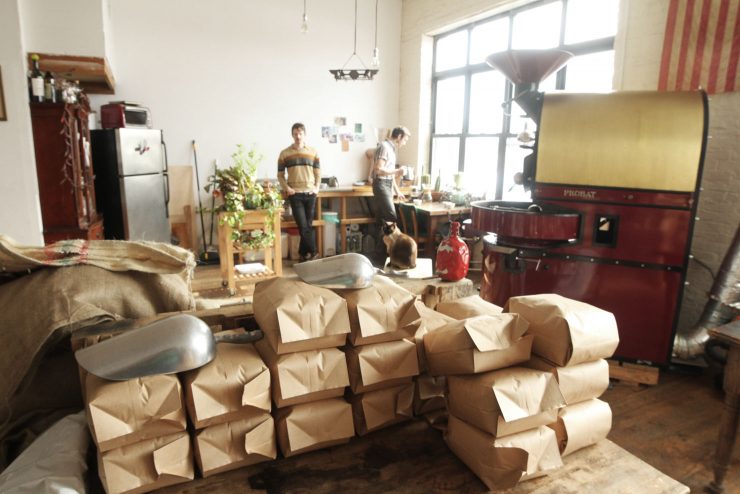
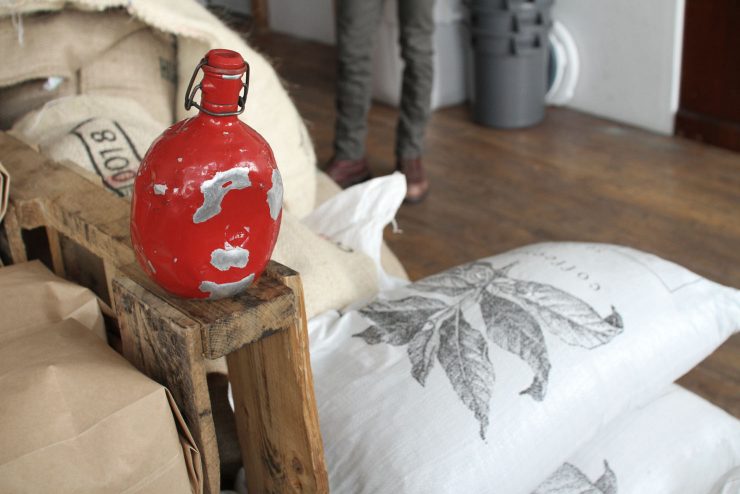
“We don’t have a lot of money in our background and investment wasn’t something we were prepared to start talking about, so with living here and roasting out of the space it freed us up to do it how we actually wanted to do it without worrying as much about the money—which is kind of a miracle in NYC,” he continues. “It worked out really well, our costs are nothing essentially, and we can focus on spending money on the things we want to spend money on: green coffee.”
“Really expensive green coffee,” adds Polk, quickly—it not being uncommon for the two to finish one another’s sentences.
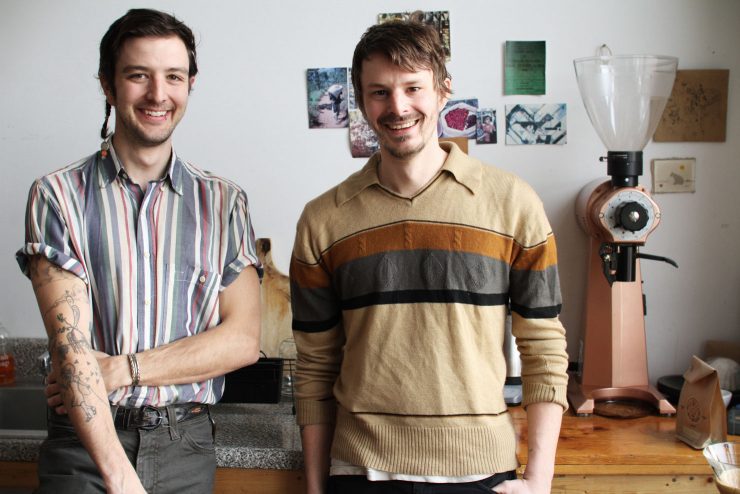
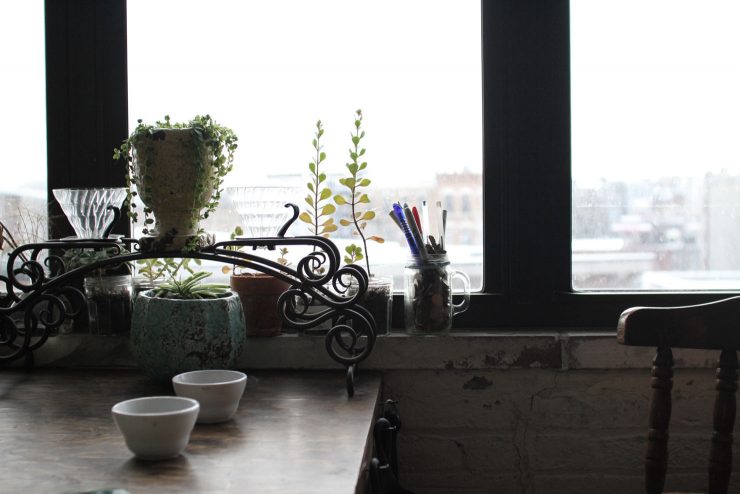
Polk’s entry into the coffee world was at Seattle roaster Zoka, where a need for personnel quickly advanced him through his coffee education. He then joined Stumptown in Seattle and then New York City, and managed the first location of Midtown’s Culture Espresso for awhile, too.
The pair currently roast about 100 lbs of their “really expensive green coffee” per week out of the Bushwick loft, sharing space and time on the Probat L12 roaster with Sweetleaf proprietor Rich Nieto, who’s currently building out his own dedicated roasting space to supply his three cafes across Brooklyn and Long Island City.
“We’ve known him for a long time,” said Schnorenberg, “and it’s been a really interesting thing roasting alongside him. It’s been really wonderful, actually, because we can talk and share roast profiles and share graphs, and have coffees together, and there’s no crossover or fear of—you’re stealing my shit!—or anything like that because we approach coffee so differently.”
“And our coffees taste dramatically different,” completes Polk. “It’s nice to talk theory, especially with Rich who likes to figure things out and be as precise as he can.”
As Nieto prepares to move out, the friends plan to up their production—and hopefully staff—by spring, supplementing their existing wholesale roster of progressive Greenpoint cafe Búðin, occasional guest spots at the Joe Pro Shop and Box Kite, and a guy named Byron who operates a lever machine on the corner of Houston and Lafayette. The roasters are slated to take over the hoppers at NoHo restaurant Estela in the near future as well, expanding their horizons into the fine dining world.
“We’ve been a little tighter on who we want to work with because we can’t necessarily support our coffees like some companies can,” says Polk.
“Right now we’re focused on multi-roaster fancy coffee shops,” appends Schnorenberg.
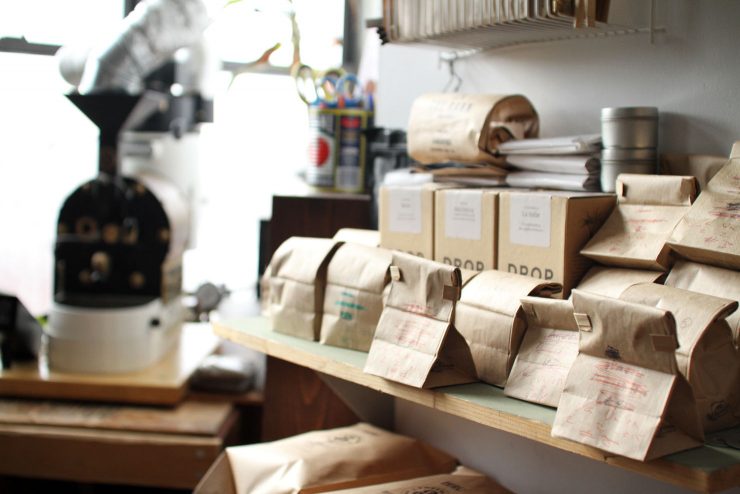
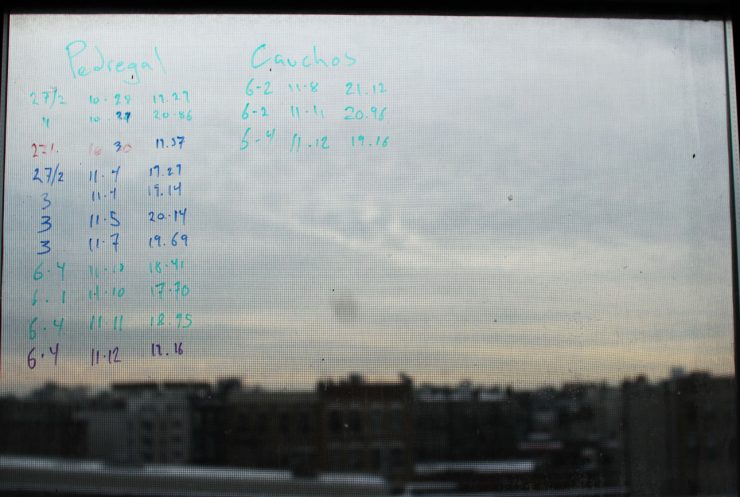
The pair sources coffee largely via Red Fox Coffee Merchants and Coffee Shrub, who “just make amazing coffees accessible to anyone who wants to buy only 50 lbs of it.” says Schnorenberg. The pair tries to focus their roasting towards the Nordic style. “We’re very geared towards trying to find complete development,” says Polk, who emphasized that they aim toward sweetness without any roast-imparted qualities, a practice he says they honed, in part, while visiting with Sweden’s Drop Coffee.
As Schnorenberg prepares to move out of the space to split time with his girlfriend between Brooklyn and the Hudson Valley, Polk is preparing to move in—from his more than yearlong residence on a sailboat tethered in nearby Newtown Creek.
“Right before doing this, Lance decided to buy a boat, so we went up to Canada and picked up a boat in New Brunswick and decided to sail down,” Polk says offhandedly.
As Polk gives up his berth on the 26′ Contessa sailboat to call this unusual corner of the former Derby Textiles factory home, he’s looking forward to bringing dreams to reality far bigger than the quality of the coffee roasted in his living room.
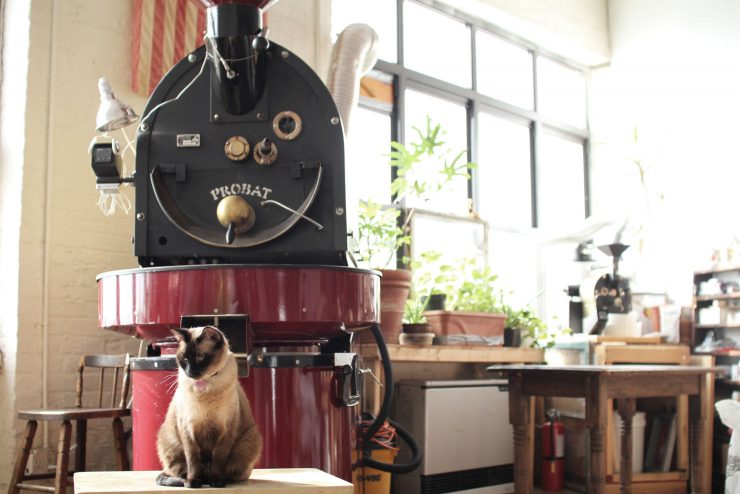
“It’s a dream of ours that we don’t end up in this crazy world of mad consumerism. We’re not very political people and we consider ourselves semi-ethical, but there’s a right way to do this and the more that that spirit is a part of our business, the more that will actually affect the bottom line. Rather than saying we’re helping people, but actually helping people from the beginning, will help us make ethical business choices,” says Polk.
Schnorenberg continues his train of thought. “How to have a career in coffee is a really difficult question to ask, or to answer. So another part of this is to try to figure out a way of creating some sort of alternative way of creating a sustainable work environment and coffee for people to actually do it as a career and have it be a sustainable way of life working in coffee. We’re in a process of trying to figure out how to turn this into a coop, so Lofted Coffee Roasters is essentially owned and operated by everyone that works for it. it’s been a pretty interesting conversation, trying to figure out if that’s an actual sustainable business model for a roastery.”
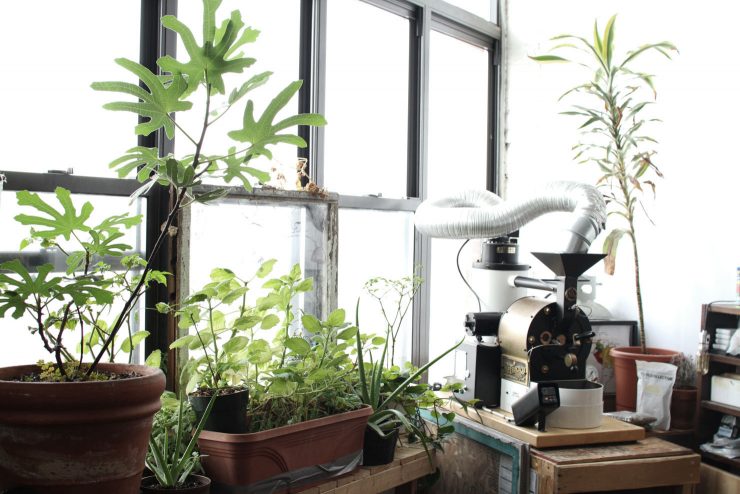
For now, the two are convinced that a focus on quality beans—like their Kivu Kibuye offering from Rwanda, or a delicate roast from La Union, Colombia—will help them push forward an industry that’s still climbing uphill to convince its end customers that the prices needed for true sustainability are worth charging.
“A lot of people tout the goal of farmers getting paid more, which is the ultimate goal,” says Polk. “But I think it’s also respect for the industry in general, and that’s what will make people start getting paid more.”
Lofted Coffee can be found at select New York retailers, including Búðin, and online at loftedcoffee.com.
Liz Clayton is the Associate Editor at Sprudge.com, and helms our NYC desk. Read more Liz Clayton on Sprudge.
An earlier version of this story incorrectly stated that Schnorenberg had worked at particular cafes. Schnorenberg was, rather, visiting in the role of enthusiast. Sprudge regrets the error.
The post In A Brooklyn Loft, Room For A Coffee Roaster And A Cat appeared first on Sprudge.

